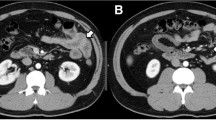Abstract
An 86-year-old woman was admitted to our hospital with anemia. She had never experienced symptoms of serositis. Colonoscopy revealed colitis with erosions and a friable mucosa. First, she was diagnosed with unclassified inflammatory bowel disease (IBD-U). We suspected familial Mediterranean fever as a differential diagnosis of IBD-U, and MEFV gene analysis showed heterozygosity for Exon2 R202Q. The patient was treated with colchicine 0.5 mg. After 4 months, a follow-up colonoscopy showed remarkable improvement of the mucosal inflammation throughout the entire colon. MEFV gene-associated enterocolitis responding to colchicine may be observed in patients with IBD-U and elucidating the role of MEFV gene mutations in intestinal inflammation is a future challenge.



Similar content being viewed by others
Abbreviations
- FMF:
-
Familial Mediterranean fever
- IBD:
-
Inflammatory bowel disease
- IBD-U:
-
Unclassified inflammatory bowel disease
- MEFV:
-
Mediterranean fever
- UC:
-
Ulcerative colitis
References
Migita K, Yuce A, Demir H, et al. Familial Mediterranean fever: overview of pathogenesis, clinical features and management. Dig Dis Sci. 2010;55:3488–94.
Wu B, Xu T, Li Y, et al. Interventions for reducing inflammation in familial Mediterranean fever. Cochrane Database Syst Rev. 2018;10:CD010893.
Migita K, Izumi Y, Jiuchi Y, et al. Familial Mediterranean fever is no longer a rare disease in Japan. Arthritis Res Ther. 2016;18:175.
de Torre-Minguela C, Mesa Del Castillo P, Pelegrin P. The NLRP3 and pyrin inflammasomes: implications in the pathophysiology of autoinflammatory diseases. Front Immunol. 2017;8:43.
Charles A, Dinarello MD. Interleukin-1β and the autoinflammatory diseases. New England J Med. 2009;360:2467–70.
Livneh A, Langevitz P, Zemer D, et al. Criteria for the diagnosis of familial Mediterranean fever. Arthritis Rheum. 1997;40:1879–85.
Migita K, Uehara R, Nakamura Y, et al. Familial Mediterranean fever in Japan. Medicine (Baltimore). 2012;91:337–43.
Ryan JG, Masters SL, Booty MG, et al. Clinical features and functional significance of the P369S/R408Q variant in pyrin, the familial Mediterranean fever protein. Ann Rheum Dis. 2010;69:1383–8.
Ben-Chetrit E, Peleg H, Aamar S, et al. The spectrum of MEFV clinical presentations—is it familial Mediterranean fever only? Rheumatology (Oxford). 2009;48:1455–9.
Gucenmez OA, Kume T, Makay B, et al. Role of fecal calprotectin in the assessment of intestinal inflammation in children with familial Mediterranean fever. Int J Rheum Dis. 2018;21:1844–8.
Sari I, Birlik M, Kasifoglu T. Familial Mediterranean fever: an updated review. Eur J Rheumatol. 2014;1:21–33.
Higashiyama M, Sugita A, Koganei K, et al. Correction to: management of elderly ulcerative colitis in Japan. J Gastroenterol. 2019;54:936–7.
Saito D, Hibi N, Ozaki R, et al. MEFV gene-related enterocolitis account for some cases diagnosed as inflammatory bowel disease unclassified. Digestion. 2020;101:785–93.
Fujimoto K, Hidaka Y, Koga T, et al. Clinical and genetic analysis of 22 Japanese patients with familial Mediterranean fever: an examination of MEFV and 10 other genes related to autoinflammatory syndromes. Intern Med. 2020;59:1373–8.
Asakura K, Yanai S, Nakamura S, et al. Familial Mediterranean fever mimicking Crohn disease: a case report. Medicine (Baltimore). 2018;97:9547.
Arasawa S, Nakase H, Ozaki Y, et al. Mediterranean mimicker. Lancet. 2012;380:2052.
Demir A, Akyuz F, Gokturk S, et al. Small bowel mucosal damage in familial Mediterranean fever: results of capsule endoscopy screening. Scand J Gastroenterol. 2014;49:1414–8.
Esaki M, Kawano S, Matsumoto T. Rare cause of duodenojejunal pseudopolyposis: report of a case of adult-onset familial Mediterranean fever. Dig Endosc. 2017;29:394–5.
Yokoyama Y, Yamakawa T, Ichimiya T, et al. Gastrointestinal involvement in a patient with familial Mediterranean fever mimicking Crohn’s disease: a case report. Clin J Gastroenterol. 2021;14:1103-7.
Agin M, Tumgor G, Kont A, et al. Endoscopic findings in patients with familial Mediterranean fever and dyspeptic symptoms. Prz Gastroenterol. 2018;13:234–41.
Ozturk MA, Kanbay M, Kasapoglu B, et al. Therapeutic approach to familial Mediterranean fever: a review update. Clin Exp Rheumatol. 2011;29:S77-86.
Sargin G, Kose R, Senturk T. Anti-interleukin-1 treatment among patients with familial Mediterranean fever resistant to colchicine treatment. Retrospective analysis. Anal Sao Paulo Med J. 2019;137:39–44.
Acknowledgements
This study was supported by the AMED (grant number 19ek0410057h0001), JSPS KAKENHI (grant number 18H02799). HN is supported by the Uehara Memorial Foundation, a Bristol–Myers Squibb research grant, and The Japanese Foundation for Research and Promotion of Endoscopy Grant.
Author information
Authors and Affiliations
Corresponding author
Ethics declarations
Conflict of interest
None of the authors have conflicts of interest to declare for this article.
Human/animal rights
All procedures followed have been performed in accordance with the ethical standards laid down in the 1964 Declaration of Helsinki and its later amendment.
Informed consent
Written Informed consent was obtained from the patient.
Additional information
Publisher's Note
Springer Nature remains neutral with regard to jurisdictional claims in published maps and institutional affiliations.
Rights and permissions
About this article
Cite this article
Shibata, Y., Ishigami, K., Kazama, T. et al. Mediterranean fever gene-associated enterocolitis in an elderly Japanese woman. Clin J Gastroenterol 14, 1661–1666 (2021). https://doi.org/10.1007/s12328-021-01497-1
Received:
Accepted:
Published:
Issue Date:
DOI: https://doi.org/10.1007/s12328-021-01497-1




